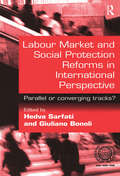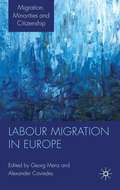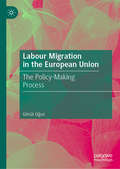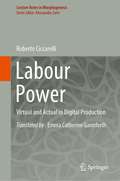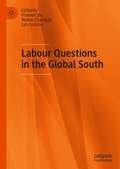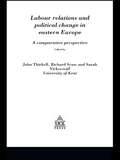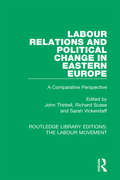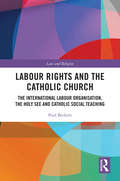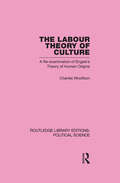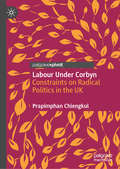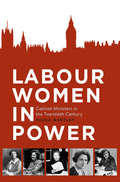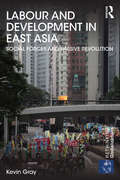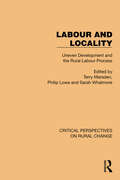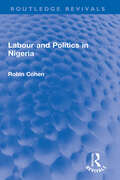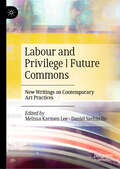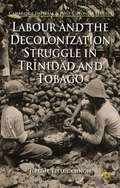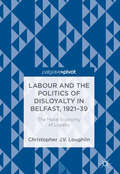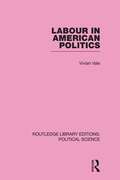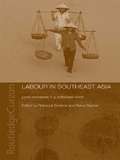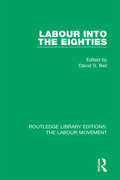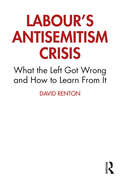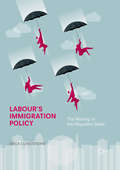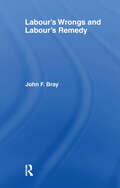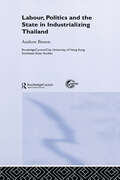- Table View
- List View
Labour Market and Social Protection Reforms in International Perspective: Parallel or Converging Tracks?
by Giuliano BonoliSocial protection systems and labour markets have undergone major changes in the past two decades. Welfare states are being reformed, scaled back and modernised; labour markets, at the same time, are more precarious, more feminised, more unequal, and throughout the OECD area, older. The interaction between labour markets and social protection has become increasingly crucial to the social and economic policy mix concerning unemployment, the transformation of work, the new poverty, and even demographics. Against this background, an interdisciplinary team of leading labour market and social protection experts from various OECD countries examine the multifaceted aspects of the changing relationship between social protection systems and labour markets. They identify and analyse key emerging issues, such as the link between employment and social protection financing, the adaptation of social protection systems to women's career patterns, and the development of new forms of social protection that aim at promoting employment. With practical policy guides and recommendations using case studies and comparative chapters, this will be engaging reading for policy-makers, social actors and academics alike.
Labour Migration and Social Development in Contemporary China (Comparative Development and Policy in Asia)
by Rachel MurphySince the mid-1980s, mass migration from the countryside to urban areas has been one of the most dramatic and noticeable changes in China. Labour migration has not only exerted a profound impact on China’s economy; it has also had far-reaching consequences for its social development. This book examines labour migration in China, focusing on the social dimensions of this phenomenon, as well as on the economic aspects of the migration and development relationship. It provides in-depth coverage of pertinent topics which include the role of labour migration in poverty alleviation; the social costs of remittance and regional, gender and generational inequalities in their distribution; hukou reform and the inclusion of migrants in urban social security and medical insurance systems; the provision of schools for migrants’ children; the provision of sexual health services to migrants; the housing conditions of migrants; the mobilization of women workers’ social networks to improve labour protection; and the role of NGOs in providing social services for migrants. Throughout, it pays particular attention to policy implications, including the impact of the recent policy shift of the Chinese government, which has made social issues more central to national development policies, and has initiated policy reforms pertaining to migration.
Labour Migration in Europe
by Georg Menz Alexander CaviedesExamining the new realities of economic immigration to Europe, this book focuses on new trends and developments, including the rediscovery of economic migration, legalization measures, irregular migration, East-West flows, the role of business and employer associations, new positions amongst trade unions, and service sector liberalization.
Labour Migration in the European Union: The Policy-Making Process
by Gönül OğuzNo analysis of migration in Europe today can avoid consideration of the role of the EU institutions, as well as the member states, in policy-making. This is because the obstacles for labour mobility which have confronted the EU in the post-enlargement period have been multi-dimensional in nature, have encompassed many different aspects of European integration process, and have operated at many different levels. Recent developments in the free movement of labour in Europe entail a comprehensive analysis of the dynamic of migration policy process, contextualising institutional change, cooperation, control and competition between the EU institutions and the member states. This book provides a picture of how governance of labour migration is constructed, managed, negotiated and decided at the European level. It brings together in an informed and well-organized way some of the key issues in the face of current migration crises and Brexit.
Labour Power: Virtual and Actual in Digital Production (Lecture Notes in Morphogenesis)
by Roberto CiccarelliThis book offers a critical account of Karl Marx’s dazzling theory of labour power which is also one of the most influential concepts in the history of contemporary philosophy. Labour power is the dark side of the digital revolution. Working men and women are invisible and treated like human service, flesh and blood automatons or organic extensions of a machine that produces data on its own. Automation is viewed as something magic made possible by algorithms whose life is independent of human beings.Labour power, however, has not disappeared. Without drivers, Uber cannot connect customers on its platform; without searches on its browser, Google grinds to a halt; without us, Facebook or Instagram is desert. Labour power is the dwarf hidden inside the puppet of technology that allows algorithms to be intelligent and make the biggest profits in the history of capitalism.The invisible centrality of labour power is the political enigma of our times. Today a new account of the theory of labour power is needed more than ever in order to understand the political economy of digital capitalism on new grounds. Unlike a long tradition in the history of work, labour power is not only the work or the data it produces, but a potency that does not coincide with its current commodification. The actuality of labour power does not exhaust the virtuality that can be actualised by its faculty. Even when reduced to a commodity, labour power does not exhaust the potency of its being otherwise.Immersed in the constant propaganda that boosts the latest technological inventions, we neglect the fact that this wealth is produced by us and that it could be ours precisely because it is a part of our potential to be other than what we are at present. This book is a vibrant invitation to consider the fact that we are always connected with the potency that is constantly at work in our life. If this were not the case, we would not be alive. If we do not strive to become consciously and collectively active, we will never know.
Labour Questions in the Global South
by Praveen Jha Walter Chambati Lyn OssomeThis book provides a focus on some of the main markers and challenges that are at the core of the study of structural transformations in contemporary capitalism and their implications for labour in the Global South. It examines the diverse perspectives and regional and social variations that characterise labour relations as a result of the uneven development which is an important facet of the intensification of capitalist accumulation.. The book provides important insights into the impact of the crises of capitalism on the wellbeing of labour at different historical junctures. Some of the issues covered by it include the conditions of work, and the changing composition of laboring classes and/or working people. The chapters also throw light on the multiple trajectories in the development of labour relations and employment in the Global South, especially after the ascendancy and domination of neoliberal finance capitalism. Some of the major aspects considered by the essays include the decentering of production and development of global value systems, crisis of social reproduction, and the rising informalisation of work.
Labour Relations In Eastern Europe: A Comparative Perspective (Routledge Library Editions: The Labour Movement Ser. #39)
by Sarah Vickerstaff Richard Scase John ThirkellThis book offers an insight into the process of transition in Eastern Europe. It provides a comparative analysis of trends in labour relations with and between countries, incorporating country studies which share a common theoretical and empirical framework. The book is intended for postgraduate and professional researchers and for library markets in the fields of industrial relations, sociology of industry/organizations/work, social structure, and politics. Its comparative framework also makes it useful for European studies.
Labour Relations and Political Change in Eastern Europe: A Comparative Perspective (Routledge Library Editions: The Labour Movement #39)
by Stephen G. JonesFirst published in 1995. This volume offers a comparative perspective on labour relations and political change in eastern Europe within a common theoretical and empirical framework. Its coverage includes Bulgaria, and Czech and Slovak republics, Hungary, Poland, and Russia. Particular attention is given to the dynamics of changes in labour relations and privatisation, which are now critical to the more general process of political and economic transformation. This title will be of interest to scholars and students of politics, sociology and modern history.
Labour Rights and the Catholic Church: The International Labour Organisation, the Holy See and Catholic Social Teaching (Law and Religion)
by Paul BeckettThis book explores the extent of parallelism and cross-influence between Catholic Social Teaching and the work of the world’s oldest human rights institution, the International Labour Organisation (ILO). Sometimes there is a mutual attraction between seeming opposites who in fact share a common goal. This book is about just such an attraction between a secular organisation born of the political desire for peace and justice, and a metaphysical institution much older founded to bring peace and justice on earth. It examines the principles evident in the teachings of the Catholic Church and in the secular philosophy of the ILO; together with the theological basis of the relevant provisions of Catholic Social Teaching and of the socio-political origins and basis of the ILO. The spectrum of labour rights covered in the book extends from the right to press for rights, i.e., collective bargaining, to rights themselves – conditions in work – and on to post-employment rights in the form of social security and pensions. The extent of the parallelism and cross-influence is reviewed from the issue of the Papal Encyclical of Pope Leo XIII Rerum Novarum (1891) and from the founding of the ILO in 1919. This book is intended to appeal to lay, professional and academic alike, and will be of interest to researchers and academics working in the areas of international human rights, theology, comparative philosophy, history and social and political studies. On 4 January 2021 it was granted an Imprimatur by the Roman Catholic Archbishop of Liverpool, Malcolm P. McMahon O.P., meaning that the Catholic Church is satisfied that the book is free of doctrinal or moral error.
Labour Theory of Culture: A Re-examination Of Engels' Theory Of Human Origins (Routledge Library Editions: Political Science #42)
by Charles WoolfsonDespite its importance in understanding the social relations of labour little attention has been paid by Western Marxists to evolutionary theory. Taking as a starting point an unfinished essay by Engels, the author argues that the human species must be seen as discontinuous with its nearest biological ancestors – that a qualitative distinction was brought about by social labour. It is argued that the most likely forms of human organization were co-operative and field studies are discussed which apparently provide evidence for tool use and linguistic ability among the higher primates. The relationship between hand and brain in terms of Marxist psychology is also elaborated.
Labour Under Corbyn: Constraints on Radical Politics in the UK
by Prapimphan ChiengkulThis book provides an accessible yet critical analysis of the Labour Party under the leadership of Jeremy Corbyn (2015-2020) in the context of the contemporary British political economy. It analyses structural constraints on left-wing politics and evaluates the transformative potential of Labour’s economic and social policies under Corbyn. Drawing from a neo-Marxist and neo-Gramscian framework, the book argues that the material, institutional and ideological conditions before 2015 opened political space for a left-wing Labour Party, although the dominant historical structures severely limited its chance of coming to power. In addition, the book argues that Labour under Corbyn should not be dismissed as ‘populist’, and that its policies aimed to redress structural economic problems, promote economic democracy and tackle contemporary challenges. The book also highlights the importance of adopting a long-term approach to counter-hegemonic political struggle so as not to shrink the space for progressive politics.
Labour Women in Power: Cabinet Ministers in the Twentieth Century
by Paula BartleyThis book examines the political lives and contributions of Margaret Bondfield, Ellen Wilkinson, Barbara Castle, Judith Hart and Shirley Williams, the only five women to achieve Cabinet rank in a Labour Government from the party’s creation until Blair became Prime Minister. Paula Bartley brings together newly discovered archival material and published work to provide a survey of these women, all of whom managed to make a mark out of all proportion to their numbers. Charting their ideas, characters, and formative influences, Bartley provides an account of their rise to power, analysing their contribution to policy making, and assessing their significance and reputation. She shows that these women were not a homogeneous group, but came from diverse family backgrounds, entered politics in their own discrete way, and rose to power at different times. Some were more successful than others, but despite their diversity these women shared one thing in common: they all functioned in a male world.
Labour and Development in East Asia: Social Forces and Passive Revolution (Rethinking Globalizations)
by Kevin GrayThe Chinese Communist Party’s response to the wave of factory strikes in the early summer of 2010 has raised important questions about the role that labour plays in the transformation of world orders. In contrast to previous policies of repression towards labour unrest, these recent disputes centring round wages and working conditions have been met with a more permissive response on the part of the state, as the CCP ostensibly seeks to facilitate a transition away from a model of political economy based on ‘low-road’ labour relations and export dependence. Labour and Development in East Asia shows that such inter-linkages between labour, geopolitical transformations, and states’ developmental strategies have been much more central to East Asia’s development than has commonly been recognised. By adopting an explanatory framework of the labour-geopolitics-development nexus, the book theorises and provides an historical analysis of the formation and transformation of the East Asian regional political economy from the end of the Second World War to the present, with particular reference to Japan, South Korea, Taiwan and China. This book will be required reading for students and scholars of international relations, development studies and comparative politics.
Labour and Locality: Uneven Development and the Rural Labour Process (Critical Perspectives on Rural Change #4)
by Sarah Whatmore Philip Lowe Terry MarsdenOriginally published in 1992, the volume shows through the lens of labour processes how global forces are played out at the local level. A range of important issues is addressed, including the commoditization and transformation of rural labour, and the role played by state policy in restructuring rural labour markets.
Labour and Politics in Nigeria (Routledge Revivals)
by Robin CohenOriginally published in 1974 and with a new introduction for the 1981 edition, this book is a clear and vivid history of the role of organized labour in the politics of Nigeria. It covers the period from the first General Strike of 1945 to the civil war and reintegration of the country. As well as providing an analysis of the characteristics and attitudes of Nigeria’s wage earners, this study is concerned with their place in the wider political and social life of the country. The attempts of the trade unions to create a representative central labour organisation are considered, as is the internal structure of the unions themselves. The book also examines the relationship of the Unions with the political parties of the first Republic and later with the Military Government. The influence of the trade unions in the determination of wage rates is analysed. The book concludes with an overview of trade unions in other parts of Africa with which the performance and characteristics of organized labour in Nigeria are compared
Labour and Privilege | Future Commons: New Writings on Contemporary Art Practices
by Melissa Karmen Lee Daniel Szehin HoThis book project was part of an annual series of Summer seminars held at Hong Kong's Tai Kwun Centre for Heritage and Arts, which brought the intellectual community together to debate the social issues of the day. The artists, writers, and scholars included in these texts represent unconventional thinkers completing rigorous scholarship that we think is important to be published today, as Hong Kong seeks for social and political alternatives. This book will be of interest to public intellectuals, political/cultural theorists and thinkers, as well as the international art community.
Labour and the Decolonization Struggle in Trinidad and Tobago
by Jerome TeelucksinghThis book provides evidence that Labour in Trinidad and Tobago played a vital role in undermining British colonialism and advocating for federation and self-government. Furthermore, there is emphasis on the pioneering efforts of the Labour movement in party politics, social justice, and working class solidarity.
Labour and the Politics of Disloyalty in Belfast, 1921-39: The Moral Economy of Loyalty
by Christopher J. V. LoughlinThis book provides the first ‘history from below’ of the inter-war Belfast labour movement. It is a social history of the politics of Belfast labour and applies methodology from history, sociology and political science. Christopher J. V. Loughlin questions previous narratives that asserted the centrality of religion and sectarian conflict in the establishment of Northern Ireland. Labour and the Politics of Disloyalty in Belfast, 1921-39 suggests that political division and violence were key to the foundation and maintenance of the democratic ancien régime in Northern Ireland. It examines the relationship between Belfast Labour, sectarianism, electoral politics, security and industrial relations policy, and women’s politics in the city.
Labour in American Politics (Routledge Library Editions: Political Science #3)
by Vivian ValeThe author analyzes the considerable legislation enacted between 1945 and 1970 and its effect on labour-management-public relations. He looks at their relevance for Britain today, and offers the most complete survey yet available of the operations of American labour as a pressure group.
Labour in Southeast Asia: Local Processes in a Globalised World (Changing Labour Relations in Asia)
by Rebecca Elmhirst Ratna SaptariIn seeking to provoke debate, the book reveals the variety of experiences evident in countries and regions marked by capitalist and (post) socialist regulatory frameworks, and contrasting labour regimes, histories and cultures. The contributions show the importance of critically examining both the complex nature of global-local links and the particular ways economic processes are around the themes of labour regimes, labour processes, labour mobility and labour communities, the essays show how economic development is not only shaped by market forces but is also interlocked in systems of meaning.
Labour into the Eighties (Routledge Library Editions: The Labour Movement #3)
by David S. BellFirst published in 1980. This book covers areas of policy interest viewed from a social democratic perspective and each chapter takes a specific issue which would have been of concern to Labour in the 1980s, including some of the more controversial areas. The study reviews various problem areas and suggests policies which are realistic and applicable in the conditions of the 1980s. This title will be of interests to scholars and students of history and politics.
Labour's Antisemitism Crisis: What the Left Got Wrong and How to Learn From It
by David RentonBetween 2015 and 2020 the Labour Party was riven by allegations that the party had tolerated antisemitism.For the Labour right, and some in the media, the fact that such allegations could be made was proof of a moral collapse under Jeremy Corbyn’s leadership. Sections of the left, meanwhile, sought to resist the accusations by claiming that the numbers of people accused of racism were few, that the allegations were an orchestrated attack, and that those found guilty were excluded from the party. This important book by one of Britain’s leading historians of anti- fascism gives a more detailed account than any yet published of what went wrong in Labour. Renton rejects those on the right who sought to exploit the issue for factional advantage. He also criticises those of his comrades on the left who were ignorant about what most British Jews think and demonstrated a willingness to antagonise them.This book will appeal to anyone who cares about antisemitism or left- wing politics.
Labour's Immigration Policy
by Erica ConsterdineThis book explains how and why the New Labour governments transformed Britain's immigration system from a highly restrictive regime to one of the most expansive in Europe, otherwise known as the Managed Migration policy. It offers the first in-depth and candid account of this period of dramatic political development from the actors who made policy during 'the making of the migrant state. ' Drawing on document analysis and over 50 elite interviews, the book sets out to explain how and why this radical policy change transpired, by examining how organized interests, political parties and institutions shaped and changed policy. This book offers valuable insights to anyone who wants to understand why immigration is dominating the political debate, and will be essential reading for those wanting to know why governments pursue expansive immigration regimes.
Labour's Wrongs and Labour's Remedy: Or, The Age Of Might And The Age Of Right (Reprints Of Economic Classics Ser.)
by John F. BrayFirst Published in 1969. Routledge is an imprint of Taylor & Francis, an informa company.
Labour, Politics and the State in Industrialising Thailand (Routledge/City University of Hong Kong Southeast Asia Series)
by Andrew BrownIn this book Brown argues that workers in East and Southeast Asia are significant actors in political change. Critically examining the themes of labour weakness, political exclusion and insignificance of 'class factors' he aims to bring workers back from the margins, demonstrating that both in the present and past the state has been entangled in processes that determine the forms of their struggles. This book presents new empirical data, important historical material and an innovative approach to workers and politics.
